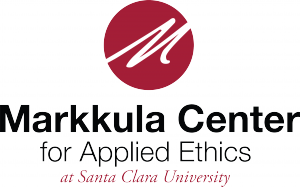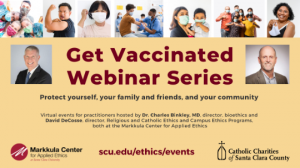Markkula Center for Applied Ethics and Catholic Charities of Santa Clara County Collaboration Supported by Grant from Conrad N. Hilton Foundation
We hope to create a model for vaccine education and distribution in marginalized communities that can be replicated across California and nationally.”
SANTA CLARA, CA, UNITED STATES, June 16, 2021 /EINPresswire.com/ -- Santa Clara University’s Markkula Center for Applied Ethics and Catholic Charities of Santa Clara County will collaborate to increase the COVID-19 vaccination rate in disenfranchised and vulnerable communities in Santa Clara County. The coalition of Catholic groups, nonprofits, and community leaders—recipients of a grant from the Conrad N. Hilton Foundation—will undertake a coordinated education, marketing, and outreach campaign highlighting the value and ethics of vaccination. — Don Heider, executive director, Markkula Center for Applied Ethics
The California Catholic Conference, the official public policy voice of the Catholic Church in California, will also be contributing to the campaign by helping to distribute information and resources to the deep network of communities they serve every day.
As the seat of Silicon Valley, Santa Clara County has a reputation for wealth, and is home to some of the most expensive zip codes in the entire country. But even within the San Francisco Bay Area, many are unaware of the drastic economic disparities in the county. Thousands of households grappling with poverty and crisis are often obscured in data, reports, and media focused on the area’s technology sector. Many vulnerable populations within the county have been marginalized due to the widening economic gap and face challenges accessing the COVID-19 vaccine.
CDC reports show that non-white Americans are comparatively under vaccinated across the country and have disproportionately high infection, hospitalization, and death rates. Nonprofits that have built strong relationships with these communities and have earned their trust are uniquely qualified to provide the needed services to close the vaccine gap and prevent additional deaths.
“Through collaborating with our partners and connecting directly with the vulnerable populations they serve, we hope to create a model for vaccine education and distribution in marginalized communities that can be replicated across California and nationally,” said Don Heider, executive director, Markkula Center for Applied Ethics.
Heider commented on these organizations’ deep experience offering a variety of services to the most vulnerable, including providing critical health and welfare services and addressing food insecurity and housing issues. “Community organizations, including many places of worship, are well positioned to reach the underserved in their neighborhoods who might be facing challenges getting vaccinated.”
All of the resources produced for this campaign, including the following, are available on the campaign website at: https://www.scu.edu/ethics/get-vaccinated/.
● Public service announcements (radio and TV)
● Educational flyers
● Answers to frequently asked questions
The campaign also features an ongoing webinar series, where we bring together a community of practitioners to provide up-to-date medical information, share best practices, and discuss the changing landscape around COVID-19 vaccination efforts. The first event will take place on June 17, 2021, at 11:00am PDT. Find more information and register for the webinar series at: https://www.scu.edu/events/#!view/event/event_id/276557
About Catholic Charities of Santa Clara County
Catholic Charities of Santa Clara County has worked to strengthen families and build economic self-reliance for the poor and vulnerable in the county for more than 61 years. Each year, more than 500 employees and 1,000 volunteers serve more than 40,000 individuals of all cultures and beliefs through 40+ programs at more than 80 sites. Program areas include behavioral health, youth and family services, economic development, employment, financial education, supportive housing, immigration legal services, in-home and long-term care, older adult services, refugee resettlement, refugee foster care, and more. Catholic Charities is working to reduce poverty with social change goals that target the alleviation, prevention, and reduction of poverty in our communities. Learn more at www.catholiccharitiesscc.org.
About the Markkula Center for Applied Ethics
Founded in 1986 with a seed grant and initial endowment from Linda and A.C. “Mike” Markkula Jr., the Markkula Center for Applied Ethics at Santa Clara University brings the traditions of ethical thinking to bear on real world problems. Beyond a full range of programs for the SCU community, the Center also serves professionals in fields from business to health care, from government to the social sector, providing innovative approaches to problems from fake news to privacy protection. Through its website and international collaborations, the Center brings ethical decision-making resources to a global audience. For more information, please visit: https://www.scu.edu/ethics/.
Joel Dibble
Markkula Center for Applied Ethics at Santa Clara Univ.
+1 408-554-5116
jdibble@scu.edu
Visit us on social media:
Twitter
LinkedIn
Facebook
Get vaccinated

